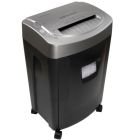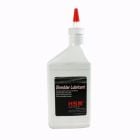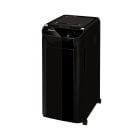Are you HIPAA Compliant? Shredders Get You 1 Step Closer
There are many reasons to have paper shredders in the workplace. For one thing, they make disposing of unwanted documents easy and convenient. They can also prevent bank account numbers and other financial information from being stolen. Also, if you deal with any type of health-related information, a shredder can help you become compliant with the Health Insurance Portability and Accountability Act of 1996 – otherwise known as HIPAA.
HIPAA is a federal set of rules and regulations pertaining to health insurance and patient privacy. When someone talks about how paper shredders related to HIPAA, they're most likely talking about the section of the act regarding the handling and disposal of patient documents. Mishandling these documents or disposing of them incorrectly can be disastrous for an organization or business that deals with health-related matters. For example, throwing a patient's file in the trash can result in civil lawsuits or even criminal charges. Civil penalties can cost you thousands or even millions of dollars depending on the severity of the violation. In the worst case scenario, arrest and even incarceration are possible. (You'll also be subject to a lot of bad publicity.) Because of these stiff penalties, HIPAA compliance needs to be a top priority.
Luckily, compliance is easy thanks to paper shredders. Any health-related documents that you no longer need should be shredded instead of thrown in the recycling bin or garage. These include but are definitely not limited to:
- Patient charts and medical histories;
- Test results and lab reports;
- Psychotherapy session notes;
- Prescription information;
- Documents pertaining to substance abuse treatment;
- Immunization and surgical histories; and
- Any records or information stored on multimedia devices such as CD's and floppy disks.
While it's definitely helpful to have one larger shredde in a centralized area (such as a copy room), it wouldn't hurt to let each person have a small shredder at his/her desk so that people can shred unneeded documents immediately. The shredders used to take care of these types of documents should be cross-cut devices so that the paper can't be reassembled.
There are some excellent cross-cut shredders on the market including ones manufactured by such big names as Fellowes, Formax, Dahle, and Standard. For example, the Dahle 20514 can shred up to 15 sheets at once and due to its 16-gallon waste bin, several people could share it. And if your office needs to get rid of multimedia items in addition to paper, something like the GBC Shredmaster GLX2030 is a great choice because it can handle CD's and shred 20 sheets at a time. There's also the Martin Yale UC5550 ScriptStroyer which can pulverize pill bottles, giving you another tool with which to make yourself HIPAA-compliant.
It's extremely important to comply with HIPAA regulations and the best way to do that is by religiously destroying health-related documents. Shredders are what you need to use to avoid civil lawsuits, criminal charges, and a damaged reputation. Start shredding today so you can become HIPAA-compliant.









